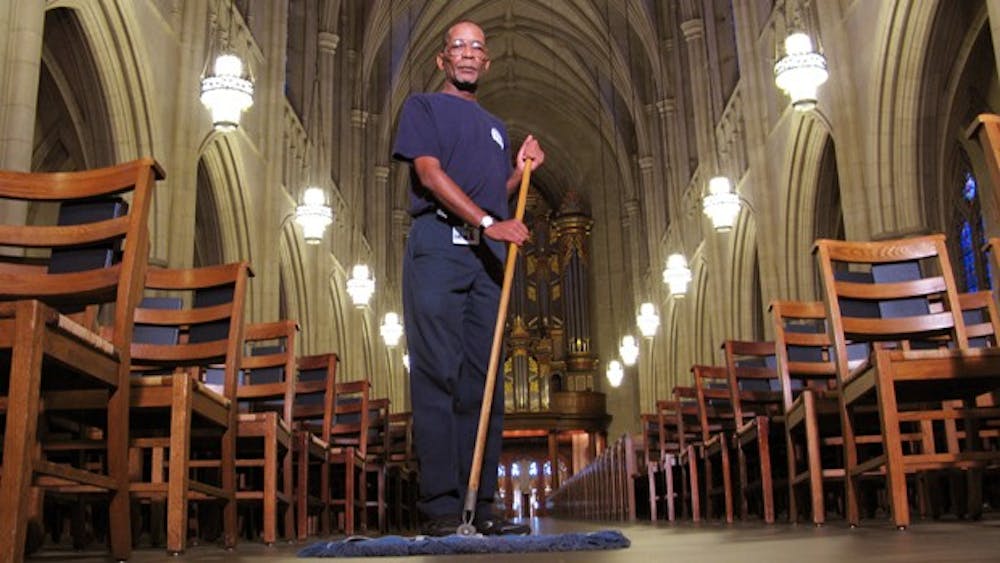GRADE: B+
“The Philosopher Kings,” a leading entry in this year’s D.C. Labor Film Fest, is a documentary capturing the lives of janitors in some of the country’s most prestigious colleges. From a young aspiring artist hauling cardboard in a Seattle art school to a Haitian family man who clocks out from his daily shift at Princeton at 3 a.m., the film gives us an intimate look at the people who work to clean the messes we leave behind every day.
In a question and answer session with the audience at the film’s screening at Georgetown University, director Patrick Chen discussed how he found his inspiration for the film. For a previous documentary, Chen interviewed a doctor often mistaken for a homeless man. During the interview, the man remarked how some of the wisest people in schools were in the more humble occupations. With that, Chen began to wonder, “How much wisdom isn’t exclusive to classrooms and universities?”
He then began the strenuous search process of calling the custodial departments of schools ranging from Ivy Leagues to small liberal arts colleges and huge state universities. After numerous interviews, Chen finally narrowed it down to eight subjects.
“I think people’s perception of a custodian is like, they are there because they don’t have another choice,” said Melinda Augustus, a University of Florida custodian interviewed in the film. “People will ask what do you do, and if I say ‘I work at the university,’ they ask ‘OK, what do you do out there?’ And I say, ‘Custodian’ — and it goes no further. I’m just a custodian.”
Corby Baker, a young 20-something custodian at Seattle’s Cornish College of the Arts, said that he finds happiness between being both an artist and a janitor at an acclaimed art school.
“It’s not so much being a custodian or janitor ... but about being in an element, I’m at home... I’m excited about art again,” Baker said. “Life should be about doing what you love. Even if it’s very difficult to do that.”
Chen shows tremendous talent in retracting anecdotes from his subjects that are incredibly personal, emotion-laden and, unsurprisingly, philosophical. The eight custodians discuss failed relationships, life-threatening accidents and other personal tragedies. Two of the film’s subjects served in Vietnam; one man describes the process of opening a trash bag after losing his arm in a brutal drunk driving accident.
Oscar Dantzler, one of the film’s most lovable subjects, is the custodian of Duke University’s incredibly regal Duke Chapel.
“There’s a mystique about [the chapel], every time I walk in here... just something comes over me,” Dantzler said. “There’s an old saying from my family, if you can’t keep the house of God clean, you can’t keep no house clean.”
The weakness in Chen’s effort lies in the messes that the audience can’t see — namely, the lack of focus the film puts on the day-to-day harshness of the custodial lifestyle. In an interview with the audience, Chen discussed how requests to interview custodial staff were met with downright refusals from schools like Harvard and M.I.T.
Many schools that have historically mistreated their custodial staff in the past were reluctant to participate in the film. Such events make us realize how little of the custodial profession we really see through the film’s rosy lens. Not every custodian is a Corby Baker, whose art school workplace serves as his muse, or an Oscar Dantzler, who is a well-liked figure and mentor on the Duke University campus.
Past the weighty anecdotes and well-worn bits of wisdom, much of the film rides on the novelty of following the people who clean our floors and chronicling the wise things they have to say. The film’s subjects have all led hard lives, like many adults, and to commend them too extremely for what most adults do — work hard, make mistakes and endure life’s bad luck — seems to be a tad bit condescending.
Luckily, Chen doesn’t labor too much on self-congratulation or being some sort of custodial anthropologist. The central message of “The Philosopher Kings” is portrayed in a clip of Bill Clinton’s address at a University of California graduation ceremony.
“When you leave here today, do you have any idea what a job we’re leaving for the people who come here and have to clean this up and pick up after us?” Clinton asks. “Do you have any idea what they make, or how they support themselves or their children or whether they believe anyone ever sees them?”
Though the film offers only a disjointed and at times overly-sentimental view of eight incredible people, it at least allows us to finally see them.
You can reach this writer at thescene@theeagleonline.com.





